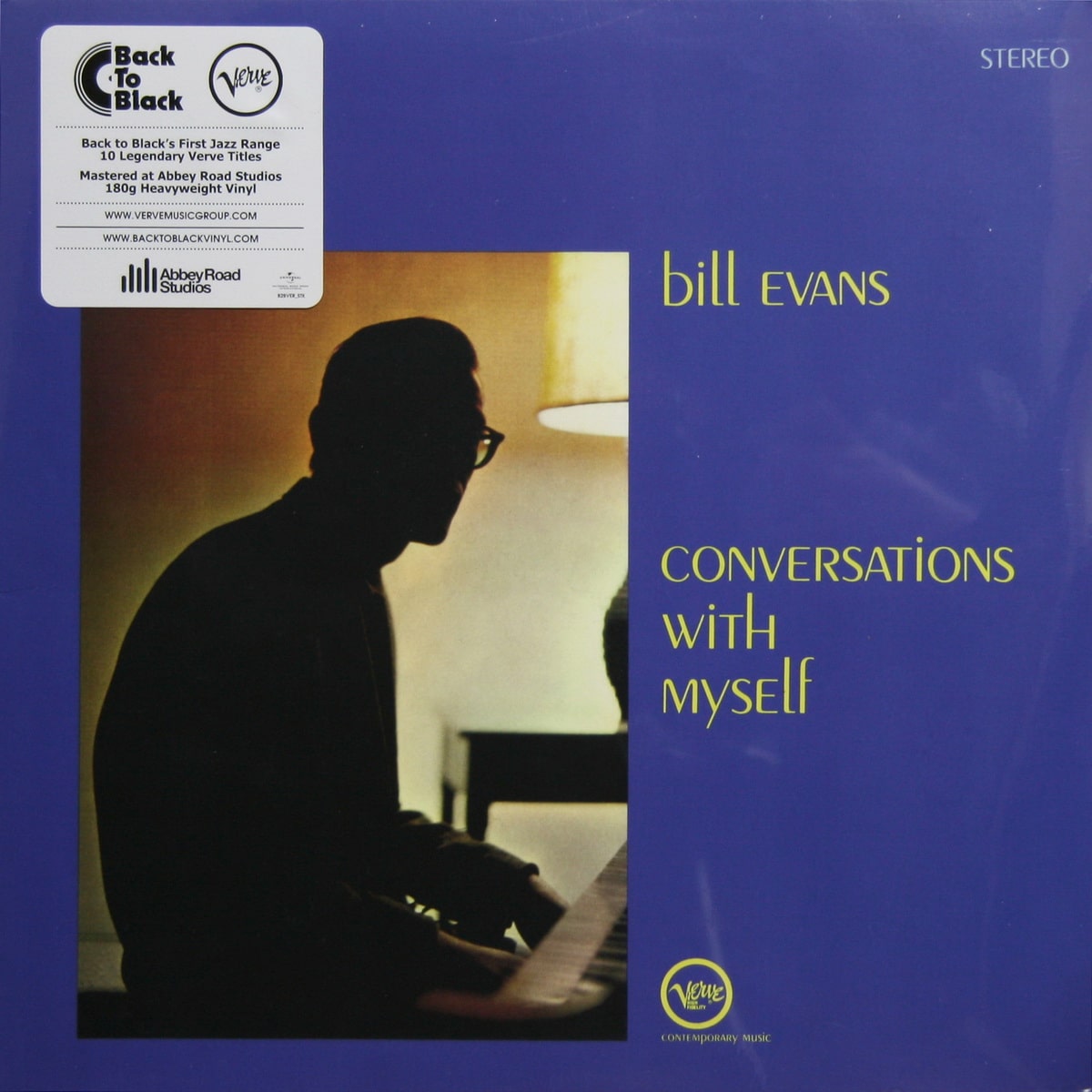

Conversations with Myself was an instant classic for the jazz community when it was released in 1963. In late 1959, Evans left the Miles Davis band and began his career as a leader, with bassist Scott LaFaro and drummer Paul Motian, a group now regarded as a seminal modern jazz trio. During that time, Evans was also playing with Chet Baker for the album Chet. In 1958, Evans joined Miles Davis’s sextet and recorded Kind of Blue, the best-selling jazz album of all time. His use of impressionist harmony, inventive interpretation of traditional jazz repertoire, block chords, and trademark rhythmically independent, “singing” melodic lines continue to influence jazz pianists today. Track 7 recorded on Februtracks 1, 2, 5, 6, 8-10 on February 9 tracks 3 and 4 recorded on May 20, 1963.Bill Evans was an American jazz pianist and composer who mostly played in trios. Tracks 9 and 10 not part of original LP release.

" A Sleepin' Bee" ( Arlen, Capote) – 4:10." Bemsha Swing" ( Denzil Best, Monk) – 2:56.All the pieces are solo with piano overdubs, a method Evans used on his. " Just You, Just Me" ( Jesse Greer, Raymond Klages) – 2:37 Further Conversations with Myself is a 1967 album by jazz pianist Bill Evans.

" Hey There" ( Richard Adler, Ross) – 4:31." Stella by Starlight" ( Young, Washington) – 4:52." Spartacus Love Theme" ( Alex North) – 5:10." How About You?" ( Lane, Ralph Freed) – 2:50." 'Round Midnight" ( Monk, Williams) – 6:35.The musical vocabulary is complex enough that the simple beauty of the songs, and Evans’ playing, is at times lost. However, for the casual fan, I would not suggest this disc. this glimpse of the artist at a heightened level of expression is very rewarding indeed. Evans' work on the ten tunes included here is truly inspired and amazing to behold. was an instant classic for the jazz community. Nastos wrote:Ĭertainly one of the more unusual items in the discography of an artist whose consistency is as evident as any in modern jazz, and nothing should dissuade you from purchasing this one of a kind album that in some ways set a technological standard for popular music – and jazz – to come. A reissue of this post pop classic by Bill Evans on 180 gram vinyl. Often stirring controversy for no key or good reason, Conversations with Myself has Bill Evans utilizing the sound-on-sound technique of reel-to-reel tape. Writing for Allmusic, music critic Michael G. It received a 5-star review in DownBeat in 1963. Details Or fastest delivery November 1 - 3.
Bill evans conversations with myself free#
The album earned Evans his first Grammy Award in 1964 for Best Jazz Instrumental Album, Individual or Group. Bill Evans - Conversations With Myself - Music CDs & Vinyl Jazz Bebop Have one to sell Buy new: 2396 FREE delivery November 2 - 7.
Bill evans conversations with myself professional#
Alongside these are three compositions by Thelonious Monk, and one Evans original, "N.Y.C.'s No Lark", commemorating Evans' friend and fellow jazz pianist Sonny Clark, who died one month before Evans began work on the album.Įvans followed Conversations with Myself with Further Conversations with Myself (1967) and New Conversations (1978), both recorded in a similar vein.Ĭritical reception Professional ratings Review scores The album features mostly traditional pop standards. Recording with Glenn Gould's piano, CD 318, at studio sessions on February 6 and 9, and May 20, 1963, Evans used the method of overdubbing three different yet corresponding piano tracks for each song. Listen free to Bill Evans Conversations With Myself (Round Midnight, How About You and more). Some thought this sacrilege and an impure. Plays the Theme from The V.I.P.s and Other Great SongsĬonversations with Myself is a 1963 album by American jazz musician Bill Evans. This is an album that courted controversy with the technique of overdubbing Bill Evans on three separate takes.


 0 kommentar(er)
0 kommentar(er)
